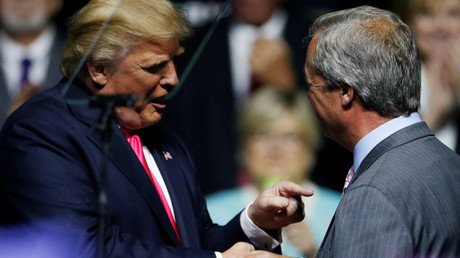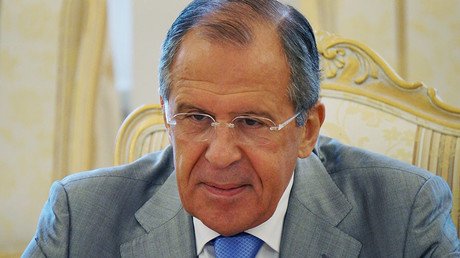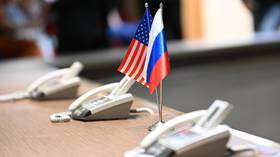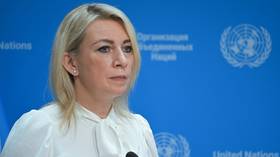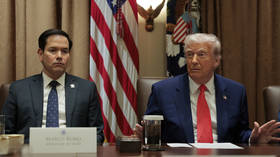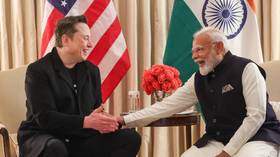'Welcome to the P*ssy Generation, where few people make sacrifices for truth'
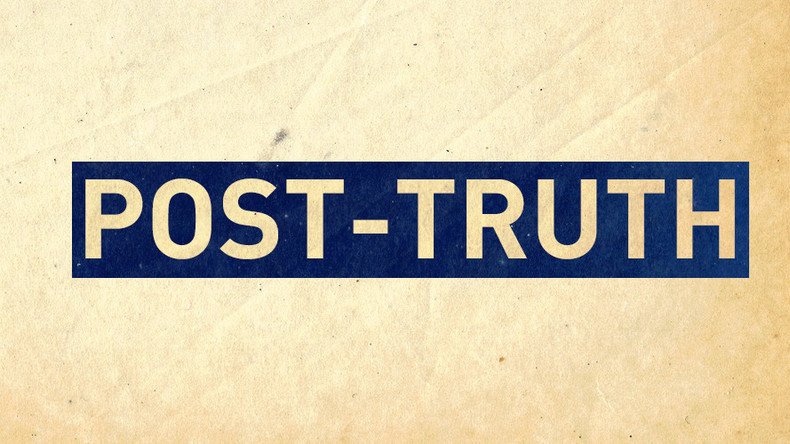
Regarding ‘post-truth’ as it relates to politics, the implication is there was a time when discourse was truthful. I don’t see that, Michael Raddie, co-Editor of BSNews, told RT. Danish journalist Iben Thranholm also provided her comments.
In the aftermath of media coverage of the US presidential election campaign and Britain's vote to quit the EU, the Oxford Dictionaries group made 'post-truth' its international word of the year.
RT: We are seeing more new terms popping up in the media reflecting the political reality of today. Take 'post-truth,' do you know this word? What are your thoughts on it? It means, "relating to or denoting circumstances in which objective facts are less influential in shaping public opinion than appeals to emotion and personal belief," according to the Oxford Dictionaries.
Michael Raddie: In terms of ‘post-truth’ as it relates to politics, the implication there is that there was a time when the discourse was truthful. I don’t see that. I haven’t seen it in my lifetime, I think. In terms of the US political landscape, we probably have to go all the way back to James Madison and the founding of the Constitution. He said that the primary goal of government is to “protect the minority of the opulent from the majority.” That is about as true as you are going to get and it still holds true today. In fact, it’s the raison d’etre of the Central Intelligence Agency, I would argue.
So, in terms of post-truth, we’ve been living in this world for many decades, if not centuries now. We have to only look back at recent events. The White Helmets, the so-called civil defense; in Syria, they were on the short list for the Nobel Peace Prize. That is post-truth because they are partisan, armed and funded by Western governments - all the things they say they are not. They are effectively an NGO for the terrorists, PR department for Al-Nusra. But in the UK so many people have given them money; they’ve raised millions of pounds and our governments have given them £20 million in the last year. And yet these are affiliated with proscribed terrorist groups. That’s the kind of insanity that we have to face in the world today… our post-truth world, as it goes.
I think what they are implying here is that the alternative or independent or the new media, as I would call it, they are to be feared, and they are to be disregarded, or viewers should be skeptical because in all cases I think, they have the time, the money and resources to actually do some investigation. Neil Clark talked about the anthrax that was held up at the UN by Colin Powell, this was before the invasion of Iraq. And most journalists, including many senior journalists in the BBC - including Jeremy Paxman - just failed to question anything regarding that testimony. And that was one of the key reasons that we went to war with Iraq. The UN debacle, effectively where Colin Powell held up the vial of anthrax and… said this is what Saddam has, that was just one person’s opinion. That is when investigations should start but at the BBC that is when the investigation stopped. Because they believe the politicians tell the truth always. This is what we have to deal with in media today and especially in the news media.
Most journalists working in the corporate media don’t have any resources to do any kind of investigation, and in fact, they don’t want to do any kind of investigation. They would rather echo the lies of the politicians as if they were the truth. This has got us into the situations like Libya, like Iraq, like Afghanistan, and it is likely to get us even more engrossed in the quagmire that is Syria. We’ve destroyed countries based on lies. So to say that we are moving into the post-truth world is a little bit more than ironic. We just have to look at our recent history to see that we’ve been living in this world for some time now.
Post-truth is the Oxford Dictionaries Word of the Year 2016. Find out more: https://t.co/jxETqZMxsupic.twitter.com/MVMuMyf83K
— Oxford Dictionaries (@OxfordWords) 16 ноября 2016 г.
RT: What about "filter bubble"? That's when a person or an outlet gets itself trapped in its one-dimensional thinking, consciously or subconsciously excluding the information they don't like. Do you think the media have found themselves in such a bubble?
MR: Information bubble or filter bubble, I think that is often used in a derogatory fashion as well to describe people that can’t see outside of the things they want to see, the information and the sources they might surround themselves with. The irony is that all of the corporate media in the US especially the financial media – that is a financial bubble and they see no wrong in the crimes of Wall Street executives, like the CEO of Morgan Stanley and Goldman Sachs and all of those people, they see them as ‘wealth creators’ and as ‘captains of industry’ and nothing could be further from the truth. If you step outside that bubble, you see the likes of Jamie Dimon, who is nothing but a bad PR for his own bank. But the pundits on Wall Street and the pundits here in the UK praise these people because they are seen as the gods of international finance… People asked the MPs several years ago "how is money created in the UK" and 80 percent thought that the government created the money. And that is because they are surrounded by this Westminster bubble, and they don’t know what happens in real life; they don’t know how banks work, the private banks on our high streets are responsible for creating 97 percent of our money supply. If our MPs don’t know that and our journalists are not telling us that. Then it is hardly surprising that the public doesn't know that. So, that media bubble and that financial bubble is all around us. It means that we are not getting informed at all…
RT: Another most popular word of 2016 is 'Putinite.' Why is it so popular? Is it used to easily to shut down anyone who sympathizes with Russian policy?
MR: Or ‘Putin apologist.’ When I returned from Syria in September, I was referred to as an Assad apologist and an apologist for the Assad crimes. It is all just smears…When I mentioned that Russia obeys international law in Syria in accordance with international law, it is ‘Putinite’ and ‘Putin apologist’is what I get referred to. That is the irony and landscape that we have to deal with. It’s a slur, and it’s meant to be ‘guilty by association’… I think the success of new media, alternative media or true independent media where they’re not totally reliant on advertisers, government sources and official sources for their news – these new media are breaking through. They’re breaking through to huge audiences, and people are ‘questioning more;’ they are doing that. They are seeking alternative news outlets, and this is a threat to the established news environment in the UK and in the US, so this is one way of trying to deal with that threat, I guess. Mainstream media struggling because people are leaving information bubble, getting news from other sources.
‘#Fakenews’ & ‘post-truth’ politics? What about those Iraqi WMDs? (Op-Edge by @NeilClark66) https://t.co/Oy0ZtVwdK3pic.twitter.com/HHlz7pyVD2
— RT (@RT_com) November 21, 2016
RT: What do you think about the post-truth politics especially in the context of the results of the US presidential elections in 2016?
Iben Thranholm, Danish journalist: Right now we are seeing that the mainstream media are trying to attack the alternative media who have been trying to tell at least a different truth to people and they are just bringing ‘fake news.' There is a huge information war. And I think this word just serves the leftist or the mainstream media.
If we look at the American election it was not about being blue or red, a Democrat or Republican, it was about right or wrong, false or true, lies or the truth. And I think people have lost confidence in the mainstream media and there is no such thing as the objective truth. That is why they want to be confirmed in their own opinions. I guess it is because we had this kind of moral crisis. I mean, the whole election was about moral integrity. So, people have lost confidence, and they don’t know where to turn to. There is a huge confusion about what is the truth and what it the lie. And I think that people are trying to seek information that confirms their convictions.
RT: Do you think the media has found itself in such a bubble, taking into consideration the 2016 US Elections coverage?
IT: I think so. I think the MSM has created this bubble. Because people are getting aware now that they are not being told the truth. Because they actually didn’t give people information so that they could make up their own opinions, but they told people what to believe, and that is a huge mistake because they were very biased and now they see the consequences of it.
RT: What do you think about another most popular word of 2016 is 'Putinite.' Why is it so popular?
IT: To me, I think it is an awesome expression. I know the word is meant in a negative way, but I think it is a word that challenges political correctness because for many people in the West Putin is an icon of being against the establishment. So, I really hope that conservative people in the West who agrees with what Russia is doing - and there are actually some that do - they would take this expression to heart and use it. I think it is wonderful, let’s go ‘Putinize’. I think it is a wonderful expression. I was very overwhelmed to see that and I thought it was great.
RT: If you were to pick the word of 2016, what would it be?
IT: I think if we look at what has been happening the last few weeks and months, I think the most trending word is actually ‘p*ssy.’ I may be risking sounding very vulgar, but I would go along with Hollywood actor Clint Eastwood who said a few months ago that this generation is a “p*ssy generation." I think he meant that many people today are trying to confront establishment and they are shouting, yelling, running on Facebook. And we saw the whole Trump movement. And by the end of the day, those people are subject to political correctness. And they are very afraid in the end to be labeled as ‘racists’ by the leftists. So, I think our generation is a generation that is very afraid or they are not willing to make sacrifices for truth. And that is why our society is crumbling. So, I guess the right word would be a “p*ssy generation.”
The statements, views and opinions expressed in this column are solely those of the author and do not necessarily represent those of RT.
